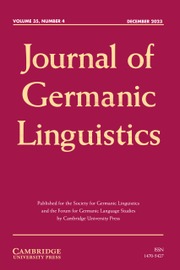No CrossRef data available.
Article contents
FOREWORD
Published online by Cambridge University Press: 09 May 2002
Extract
The papers in the special focus issues of the Journal of Germanic Linguistics (13.4 and 14.1) testify to the continuing significance of Afrikaans sociohistorical linguistics. Even before its official “birth,” recognition, and christening, Afrikaans had been the subject of debate, discussion, dissension, and adulation. Within linguistics, it has excited attention from Hesseling onward on account of the transformation of Dutch grammar evident in some facets of its structure and lexicon. The extent of the transformation and the participation of indigenous and enslaved people in the process have proved what my co-editor, Paul Roberge (1995:72), once called an “enduring crux ” in sociohistorical linguistics. With the promotion (and consequent further politicization) of Afrikaans in the apartheid era (1948–1994), the issue of origins became an ideologically polarized one. It seemed to me in the 1980s and 1990s that linguists in South Africa, with a few exceptions, weren't keeping pace with developments in creolistics; and, conversely, scholars versed in creolistics weren't always paying attention to the full span of the data on the transformation of Dutch in South Africa. With the academic boycott of apartheid South Africa, there seemed little opportunity for full, free, and frank scholarly exchange.
- Type
- Other
- Information
- Copyright
- © 2002 Society for Germanic Linguistics




